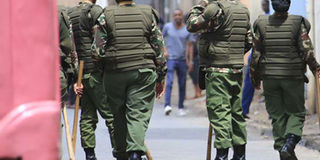You can be an officer without touching a gun

Administration Police officers disperse protesting traders in Nairobi on April 12, 2019. The word officer is increasingly confined to such security individuals as soldiers and police persons. PHOTO | JEFF ANGOTE | NATION MEDIA GROUP
What you need to know:
- For the semantic purposes of public information organs – like newspapers, radio and television - there is a clear and essential semantic difference between officers and officials.
The nouns “officer” and “official” may be interchanged.
So, nearly always, the officials of our NGOs include the chairperson, the secretary and the treasurer.
Yet, elsewhere in the English-speaking world, the word officer is increasingly confined to such security individuals as soldiers and police persons.
In practice, the occupants of all police and army positions are differentiated from their white-collar counterparts only by calling the security ones officers, as opposed to officials.
But the reason escapes my ken (especially since few policemen and even fewer policewomen ever seem to sit in any real offices).
That was why I was initially puzzled by the headline “Court gives officers 10 days to produce lawyer in son’s shooting probe”.
SEMANTIC
In that formulation (on page 3 of The Daily Nation of April 4), “officials” – not “officers” – was the word that a language-conscious sub-editor would have used.
For the semantic purposes of public information organs – like newspapers, radio and television - there is a clear and essential semantic difference between officers and officials.
Officers usually mean members of a country’s security forces, including soldiers and police cadres. But you can be an official even if you have never entered any room in any office building.
“Contrariwise” – as one hilarious English novelist used to quip - you can also be an officer even if you have never touched a gun in your life.
DIFFERENCE
Howbeit, the word cadres seems to be confined to occupants of actual offices in buildings. That is perhaps why, while the chief police commander may be an official, everybody else in the whole police department is only an officer.
One notable difference between an official and an officer is that, in most countries – including Kenya – while every policeman or policewoman reports to the police commander-in-chief, this latter position always seems to go to a very fierce-looking he-man.
Why is it that, throughout the human world, including in our own country, the position of the chief police commander - always appears reserved for men as fiercely negatively masculine as Idi Amin Dada was?
That is what has enabled the ugliest bulldogs to become the premiers and even presidents of many human states, though even those who are never likely to occupy any real physical office, every ordinary policeman or policewoman is called an “officer“.
CONTRADICTION
The majority of the police system of every nation are described as “field officers”.
Yet even such a self-evident terminological contradiction as an “officer in the field” never seems to occur to the leaders of the human world who appoint them.
The question is: How can a person be called an officer if he or she has never even entered an office building?
In every human community, even merely nominal positions (far away from any real office buildings) has come to be called an “office” and its occupant an “officer” , even an “official”.
It is just one of the contradictions in which language communities often plunge without even batting an eyelid.
Philip Ochieng is a veteran journalist.





